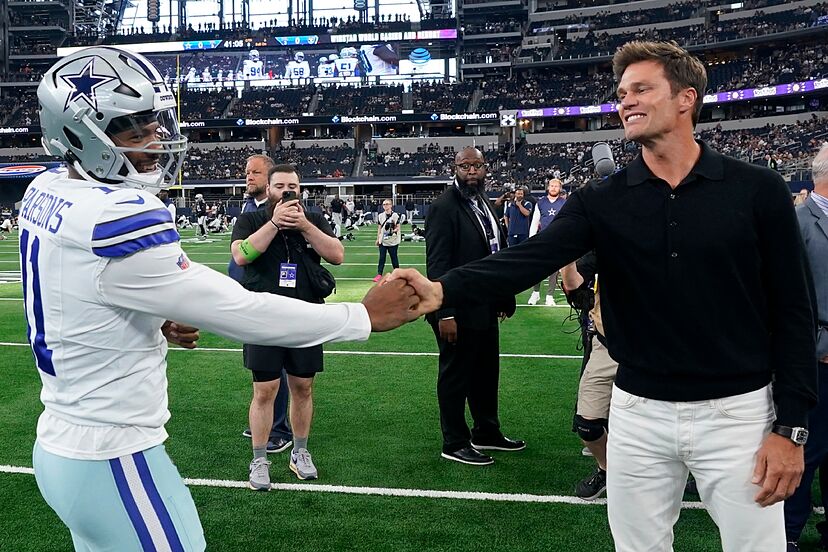Robert Littal on Being Careful Trying to Compare Shedeur Sanders and Bronny James Situations
In the world of sports, few storylines capture attention like the rise of a famous athlete’s child. Bronny James, son of NBA legend LeBron James, and Shedeur Sanders, son of NFL icon Deion Sanders, are two young stars navigating this high-stakes path. Both are talented, driven, and carry the weight of their fathers’ legacies, yet […] The post Robert Littal on Being Careful Trying to Compare Shedeur Sanders and Bronny James Situations appeared first on BlackSportsOnline.

In the world of sports, few storylines capture attention like the rise of a famous athlete’s child. Bronny James, son of NBA legend LeBron James, and Shedeur Sanders, son of NFL icon Deion Sanders, are two young stars navigating this high-stakes path. Both are talented, driven, and carry the weight of their fathers’ legacies, yet the media’s coverage of them couldn’t be more different. While Bronny’s every move is dissected under a microscope of skepticism, Shedeur is often celebrated as a rising star in his own right. What drives this disparity, and what does it reveal about sports media’s priorities?
Bronny James: The Burden of the King’s Shadow
Bronny James entered the public eye with a last name that’s synonymous with basketball greatness. As LeBron’s eldest son, his journey has been covered relentlessly since high school. From his Sierra Canyon highlights to his one-year stint at USC, every dribble, shot, and decision has been analyzed with an intensity that feels disproportionate to his accomplishments. When the Los Angeles Lakers drafted him 55th overall in 2024, “nepotism” echoed across headlines and talk shows. Critics questioned whether Bronny belonged in the NBA, pointing to his modest college stats—4.8 points per game in 25 appearances—and a cardiac scare that limited his freshman season.
The media narrative around Bronny often feels like a referendum on LeBron’s influence. Pundits like Stephen A. Smith have openly challenged Bronny’s readiness, with Smith once pleading for LeBron to “stop” pushing his son into the NBA spotlight. Social media amplifies this scrutiny, turning Bronny’s G League performances—where he’s shown promise, averaging 20.6 points recently—into battlegrounds for debates about privilege. Even his highlights, like a 30-point G League game, are tempered by caveats: “He’s still got a long way to go.” The coverage rarely lets Bronny stand alone; he’s framed as an extension of his father’s legacy, with every success or stumble weighed against LeBron’s towering achievements.
Shedeur Sanders: The Prime Time Prodigy
Contrast this with Shedeur Sanders, the Colorado Buffaloes quarterback poised to be a top pick in the 2025 NFL Draft. Shedeur’s coverage is markedly different—confident, optimistic, and focused on his potential. As Deion Sanders’ son, he’s no stranger to fame, but the media portrays him as a polished talent who’s earned his stripes. His college stats—3,485 yards and a Johnny Unitas Golden Arm Award in 2024—bolster this narrative. Even when critics nitpick, like questioning his pocket presence or “arrogance” at the NFL Combine, the tone remains constructive, framing him as a future star refining his craft.
Shedeur’s media story is one of triumph over adversity. Outlets highlight his leadership at Jackson State, where he led the team to back-to-back conference titles, and his resilience at Colorado despite a porous offensive line that left him sacked 94 times over two seasons. Unlike Bronny, Shedeur’s coverage rarely dwells on his father’s shadow. Deion, or “Coach Prime,” is portrayed as a mentor elevating his son’s game, not orchestrating his path. When Shedeur shines, like in a Pro Day display of pinpoint accuracy, the praise feels unreserved: “He’s ready for the NFL.”
Why the Difference?
Several factors explain this divergence. First, their sports play a role. Basketball, particularly the NBA, is a star-driven league where individual performances are magnified, and LeBron’s global fame casts an inescapable shadow. Football, with its larger rosters and team-oriented nature, allows Shedeur to carve a distinct identity, even under Deion’s charismatic guidance. Shedeur’s position as a quarterback—a role demanding leadership—also aligns with narratives of earned respect, while Bronny, a developing guard, faces harsher comparisons to elite peers.
Second, their career stages matter. Shedeur has had four years of college football to build a résumé, including standout performances that justify his hype. Bronny, at 20, is newer to the professional stage, with only one abbreviated college season before entering the NBA. His draft position—near the end of the second round—invites skepticism about his readiness, while Shedeur’s projected top-10 status signals consensus belief in his skills.
Finally, media bias and cultural dynamics can’t be ignored. Bronny’s coverage often feels tinged with resentment, as if his opportunities are unearned, a sentiment some argue stems from fatigue with LeBron’s dominance or broader discomfort with Black athletes wielding influence. Shedeur, meanwhile, benefits from Deion’s underdog-to-icon story, which frames his son’s rise as a continuation of hard-won success. The media’s warmer tone toward Shedeur may also reflect less pressure to “prove” himself against a figure as singular as LeBron.
The Bigger Picture
The contrast in how Bronny and Shedeur are covered reveals much about sports media’s tendencies. Bronny’s story is a lightning rod for debates about privilege and merit, amplified by his father’s polarizing presence. Shedeur’s narrative, while not without critique, is one of potential fulfilled, buoyed by his own stats and Deion’s coaching halo. Both young men are talented, but the media’s lens—shaped by sport, timing, and cultural baggage—paints them in starkly different hues.
As Bronny grinds in the G League and Shedeur prepares for the NFL, their paths will continue to diverge. But the disparity in their coverage should prompt reflection: Are we judging these athletes for their play, or are we projecting our biases onto their last names? For Bronny and Shedeur, the challenge isn’t just proving themselves on the court or field—it’s outrunning the narratives we’ve already written for them.
The post Robert Littal on Being Careful Trying to Compare Shedeur Sanders and Bronny James Situations appeared first on BlackSportsOnline.

 UnmutedSports
UnmutedSports 










